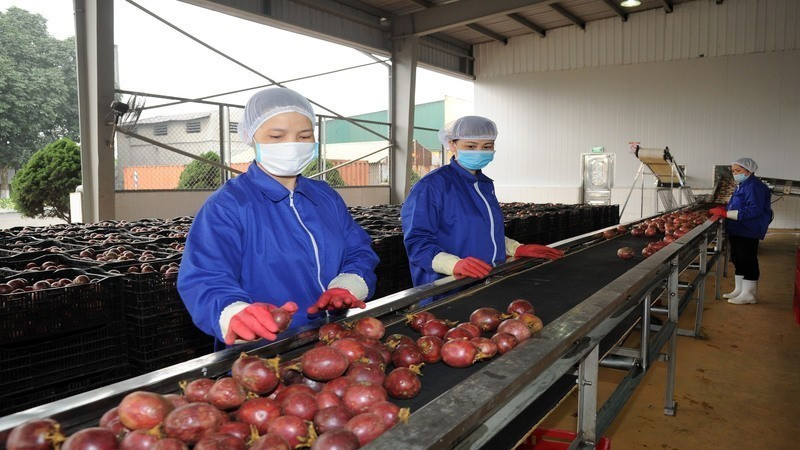The OCOP programme and rural tourism development are being strongly promoted by the Government and the Ministry of Agriculture and Environment.
Impressive figures
After more than five years, the country now has nearly 17,400 recognised OCOP products, of which 9,345 originate from cooperatives, enterprises and household producers. Quang Ninh is among the leading provinces in OCOP development with 437 products rated three stars or higher.
Vice Chairman of the Quang Ninh Provincial People’s Committee Nguyen Van Cong said that the 2021–2025 OCOP programme has helped drive agricultural restructuring and improve people’s livelihoods.
From an initial 40 economic organisations, the province now has 180 organisations and production facilities participating in OCOP. Most economic models show strong linkages between production and agricultural consumption, generating jobs for local workers.
The production and processing model for golden camellia tea of Dap Thanh Forest Products Joint Stock Company in Ba Che Commune is considered a highlight. From a small-scale household producer, Trang expanded the golden camellia tea growing area to several dozen hectares. Ba Che golden camellia tea has been recognised as a 5-star OCOP product and has become a signature brand of Quang Ninh, available in many supermarkets, tourist sites and events within and beyond the province.
Director of Dap Thanh Forest Products Joint Stock Company shared: “Joining the OCOP programme was a major turning point, helping us standardise production processes, establish a firm market position, and create regular jobs for dozens of local workers with an income of about 8 million VND (303 USD) per person per month.”
While Ba Che (Quang Ninh) asserts its position and develops the local economy with a 5-star OCOP product, in Thai Nguyen Province, residents of the Thai Hai Ecological Stilt House Conservation Village in Tan Cuong Commune choose to preserve cultural identity as a foundation for community-based tourism.
Nestled amid lush midland hills, the Thai Hai Ecological Stilt House Conservation Village is a place where ancient Thai culture is preserved intact—from stilt houses and customs to cuisine, then singing and the sound of the tinh lute.
Village head Nguyen Thi Thanh Hai shared: “The most important thing is that culture must not only be retold but must be lived in the daily lives of local people. We welcome visitors with sincerity, through our way of life and our culture.”
Each year, the Thai Hai Ecological Stilt House Conservation Village welcomes tens of thousands of visitors, providing stable jobs for more than 100 workers with an income of 6–8 million VND per person per month.
Nguyen My Hai, Deputy Director of the Thai Nguyen Department of Agriculture and Environment, said that after the administrative merger, the province possesses not only natural tourism resources such as national parks, nature reserves, rivers, streams, lakes, waterfalls and caves, but also rich cultural tourism resources from 51 ethnic groups, one UNESCO-recognised intangible cultural heritage, and 45 national intangible cultural heritages.
This presents an opportunity for the province to plan and develop tourism in a professional, modern and effective direction.
According to the Ministry of Agriculture and Environment, the country currently has more than 600 agricultural and rural tourism models. Notably, over 200 OCOP products related to community-based tourism services and tourist sites have achieved a three-star rating or higher. These models not only help increase income and preserve local culture but also build the image of a civilised, liveable and attractive Vietnamese countryside for domestic and international visitors.
Bringing OCOP products and tourism further
Minister of Agriculture and Environment Tran Duc Thang stated that as the country enters a new development phase, the OCOP programme must be implemented more effectively and sustainably, aligned with the goal of improving rural people’s livelihoods; and that rural economic development must go hand in hand with social, environmental and cultural development.
At the local level, Nguyen Van Cong, Vice Chairman of the Quang Ninh Provincial People’s Committee, proposed that the Ministry of Agriculture and Environment continue advising the Government to introduce consistent mechanisms and policies, apply digital transformation in quality management, consumption linkages and value-chain development from production to distribution, enabling Vietnamese OCOP products to establish their brand both domestically and internationally.
Nguyen My Hai, Deputy Director of the Thai Nguyen Department of Agriculture and Environment, noted that in the coming period, the province will focus on developing agricultural tourism associated with building modern and sustainable new-style rural areas. The province is finalising planning and mechanisms to attract businesses to invest in this sector while mobilising maximum resources to support OCOP products, craft villages and community-based tourism models.
According to Deputy Minister Tran Thanh Nam, the Ministry of Agriculture and Environment will concentrate on five key tasks and solutions so that OCOP products are not only the story of agricultural goods but also a pathway for multi-value rural economic development, linking production, tourism, culture and the environment; continuing to accompany localities, enterprises and residents to promote the sustainable development of the OCOP programme and elevate it into a national brand.
















